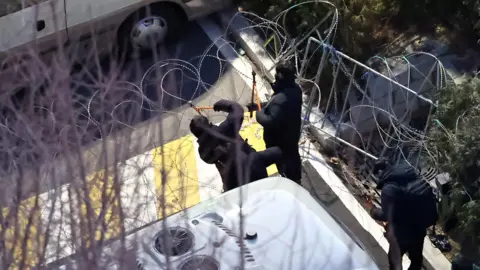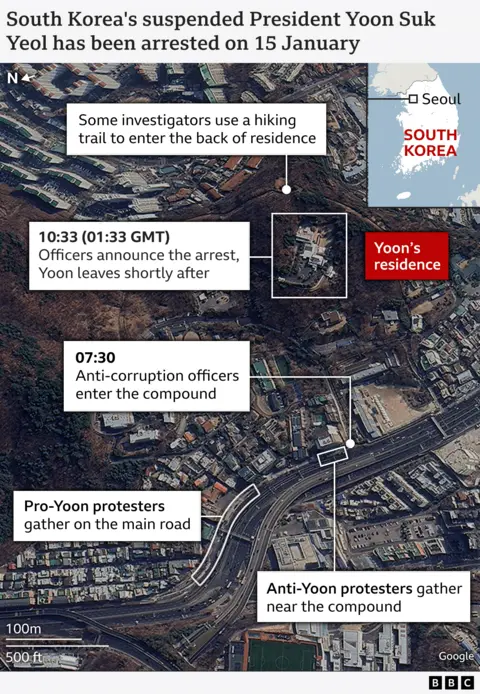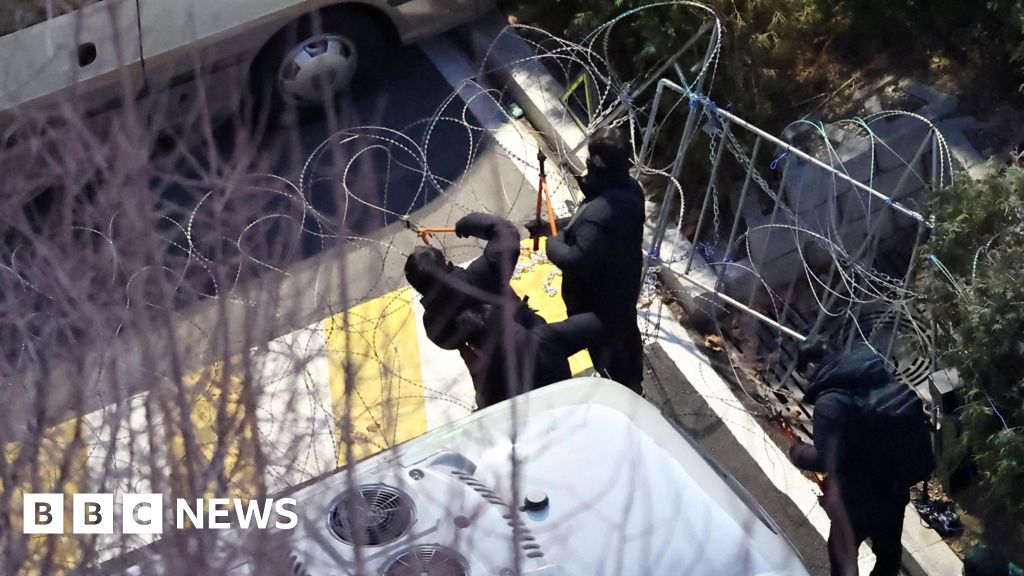 Reuters
ReutersYoon Suk Yeol has become South Korea’s first sitting president to be arrested after investigators raised barricades and cut through barbed wire to take him into custody.
Yoon, 64, is being investigated on sedition charges for a failed martial law order on Dec. 3 that threw the country into turmoil.
He has also been impeached by parliament and suspended from office – but will not be removed from his post until the Constitutional Court rules on his impeachment case.
However, Yoon’s dramatic arrest on Wednesday ends a weeks-long standoff between investigators and his presidential security team.
The Corruption Investigation Office (CIO) had previously tried to arrest him on January 3 but they were blocked by buses and barbed wire.
But just before dawn on Wednesday, a team of investigators arrived, armed with ladders to climb over the buses and pliers to cut through the barbed wire.
Other officers in the team – which numbered around 1,000 – scaled walls and hiked up nearby paths to reach the presidential residence.
After several hours, authorities announced that Yoon had been arrested.
In a three-minute video released just before his arrest, the 64-year-old executive said he would cooperate with investigators while repeating his earlier claims that the warrant was not legally valid.
He said he witnessed authorities “invading” the security area of his home with fire equipment.
“I decided to appear before the CIO, even though it is an illegal investigation, to prevent unwanted bloodshed,” he said.
Yoon’s People Power Party declared his arrest “illegal”, and its leader Kweon Seong-dong described Wednesday’s events as “regrettable”.
But the floor leader of the opposition Democratic Party, Park Chan-dae, said Yoon’s arrest showed that “justice in South Korea is alive”.
This arrest “is the first step towards restoring constitutional order, democracy and the rule of law,” he said during a party meeting.
The country is currently led by Finance Minister Choi Sang-mok as Acting President. He was put in power after the first acting president, Han Duck-soo, was also impeached of the opposition majority parliament.
On Wednesday afternoon, investigators said Yoon was being questioned but had invoked the right to remain silent.
Yoon is expected to be detained overnight at the Seoul Detention Center in Uiwang, Gyeonggi Province, about 5 km (3 mi) from the CIO’s office.
However, if a court does not issue an arrest warrant within 48 hours of Yoon’s arrest, he will be released and free to return to the presidential residence.
Pro-Yoon supporters have continued to protest the arrest outside the investigation office where he is being held.
They gathered outside Yoon’s house on Wednesday morning along with those who opposed him.
The anti-Yoon crowd cheered, clapped and broke into a “congratulations and celebration” chant when his arrest was announced.
However, the Pro-Yoon camp was horrified. “We are very upset and angry – the rule of law has broken down,” one supporter told the BBC.
While the vast majority of South Koreans agree that Yoon should be held accountable for martial law, they cannot agree on what accountability looks like, Duyeon Kim, an adjunct senior fellow at the Center for a New American Security, previously told the BBC.
On Wednesday morning, the two sides underlined the deep divisions in the country – a sign that the political crisis is not over yet, as more uncertainty looms.


